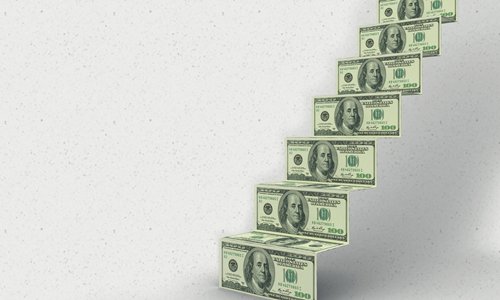
Though many American expats in China believe that Trump's tax cut bill will improve America's business and working environment, they still believe that China has more opportunities. Photo: IC
President Donald Trump's new tax bill went into effect on January 1. Under the new tax bill, the corporate tax decreased from 35 percent to 21 percent, and the individual income tax threshold was raised to $12,000.
As soon as the news was released, many Americans in China were thrilled about the prospect that America's business and investment environment will be improving soon, and Alex Edmunds is one of them.
Edmunds moved to China in 2009, and he owns a real estate development and broker company Mandeville Capital with offices in Los Angeles, Seattle, Dallas, Beijing, and Shanghai.
"I believe Trump's new tax cut policy will improve the US business and investment environment and attract some overseas US workers and businesses to come back to the US," Edmunds said.
Trump's new tax cut bill stirs up a heated discussion from Chinese media on whether it will trigger the US' overseas manufacturing companies, intellectual properties and high-tech talents to reflux back to the US, which is a huge loss to Chinese economic development, according to a Global Times report on December 2017.
However, in Edmunds' opinion, the new tax bill will have some effect in attracting Americans like him to go back home to develop business, but the effect will be limited.
"The most important thing to a company is the business opportunities in the market, the tax treatment is a secondary consideration," Edmunds said. "And China still holds great business opportunities."

American entrepreneurs in China believe that business opportunities are the most important thing to consider in the business world, and taxes are a secondary thought. Photo: IC

American entrepreneurs in China believe that business opportunities are the most important thing to consider in the business world, and taxes are a secondary thought. Photo: IC
Limited effects
Edmunds moved to Beijing after the 2008 financial crisis. Business opportunities were bleak back then. Since he was already very interested in China and China is one of the most promising economies around the world, he came to China to seek opportunities like many Americans did.
As an aspiring young American entrepreneur, Edmunds applauds Trump's new tax cut bill.
Edmunds studied economics and finance at Princeton University. According to Edmunds, one of the main lessons from Nobel Economist Paul Krugman's class was how perverse America's double taxation system is - that companies pay a corporate tax and then company shareholders pay tax again when they get a distribution.
This tax overhaul fixes this issue by dropping the corporate tax rate; this is a huge improvement, according to Edmunds.
"It certainly improves the investment environment because the after-tax takeaway for corporate investment will now be much higher," Edmunds said.
The tax cut bill along with other promising economic signs maybe bring more overseas Americans and businesses back to the US, according to Edmunds.
"Besides the new tax cut bill, the economy and employment have been very strong in the US the last several years, and that creates a more vibrant market for goods and services. Federal interest rates have been rising, which creates a more favorable investment environment and a long-term stronger US dollar.
Now, corporations in the US can keep on average an extra 15 percent of their earnings in saved taxes, so business owners will enjoy that windfall," Edmunds said.
However, Edmunds also admitted that the effect is still limited.
"In my experience, businesspeople make decisions because of market opportunity; the tax treatment is an afterthought."
Companies find and optimize their competitive advantage in the market and will pursue growth where the market supports it - whether that is developing the market in China, domestically in the US or between the two economies. Tax treatment is secondary to the fundamental performance of the business, Edmunds explained.
"China still maintains a high economic growth speed and many opportunities, so I don't think the tax cut bill will have much impact on American business people in China," he concluded.
Edmunds' company develops single-family residences and apartment complexes in California, Seattle and Texas, and most of his clients are from China.
"Our business model is market-driven. This is a big and ever-growing market. Therefore, in the future, I will keep my focus on real estate opportunities between China and the US. It's the opportunities that really matter," Edmunds said.
Mary Peng, a Chinese American who owns the International Center for Veterinary Services also said that as her business becomes bigger and the hospital's reach becomes global, she would consider expanding to the US.
"But it's just not the company tax level that goes into consideration, things like start-up cost, investment, labor cost and the customer flow are all very important," Peng said.
Peng also pointed out that now the tax rates in China for small and medium enterprises (SMEs) like hers are quite high. She thinks the government is not providing enough support for SMEs, and the individual tax rate in China can be quite high too.
"When the tax rate is this high, it creates incentives for high-income individuals to find ways to avoid paying taxes, and the government and our society ultimately lose out," Peng said.
An expert's opinion
Bai Ming, a research fellow at the Chinese Academy of International Trade and Economic Corporation, shares a similar opinion with the young American entrepreneur.
Trump's tax cut policy will have a certain level of influence on the American entrepreneurs and employees in China, and some of them will rethink the location they work and live in.
"The US' tax cut policy will divert some expats and foreign investments from China; that's for sure," Bai said.
But the tax rate is not the deciding factor for people when they choose the countries they work in, according to Bai.
"It's the business and job opportunities that really matter, they are the foundation, and the general living environment," Bai said. "In terms of business and job opportunities, China still has more room to grow than any other country."
Bai added that the foreign talents and investments will only return to the US when they cannot get the opportunities in China, or the investment environment has taken a bad turn, then Trump's tax cut policy will stimulate them to go back to the US.
"But cities around China are launching policies to improve the working, living and business environments to attract foreign talents and investments," Bai said.
The Chinese government issued the Notice Regarding Measures to Accelerate Increase of Foreign Investment in August 2017 to attract more foreign investments and talents, Bai introduced.
The notice specifies various policies to improve the environment for foreign talents and investment, including reducing the limitations on foreign investment admission, setting out favorable finance and taxation policies for foreign investments in China, improving the business environment for foreign companies in China and improving the investment environment in state-level development areas. It will also make it more convenient for foreign talents to enter and exit China, including making it more convenient for foreign talents to get working permits, extending the foreign talents visa's validity periods and issuing 5- to 10-year multiple entry visas to foreign talents that fit the standard.
Besides, according to Bai, foreign companies moving back to the US could cause loss to the companies themselves, since most foreign companies' industrial chains are in China and their upstream and downstream partners are all in China. They could save some taxes by moving back, but the cut would not cover the additional cost of losing their upstream and downstream partners and international logistics.
The US' competitive advantages lie in the research and development of high-technology, the updating of technology and the future. According to Bai, in other industries, developing countries still enjoy the advantage of lower costs.
Bai also pointed out the US' new tax cut bill serves as a reminder that China should also lower its tax rate.
Bai said that China does have a higher level of tax, and with or without Trump's new tax cut policy, the Chinese government needs to lower the tax for corporations so that companies in China will have more resources to expand and grow their businesses; it will be good for the economy.
According to a sohu.com report in December, Li Weiguang, a professor at Tianjin University of Finance and Economics, said that Chinese companies' tax rate is around 40 percent, which is very high. The US' new tax cut bill will pose pressure for the Chinese government to lower the tax rate.
"Our country needs to lower the tax rate a little bit to release the Chinese companies' pressure so that they can improve their competitive strength," Bai said.
"But we need to remember that the real competitive strength lies in technology levels and the brands."


